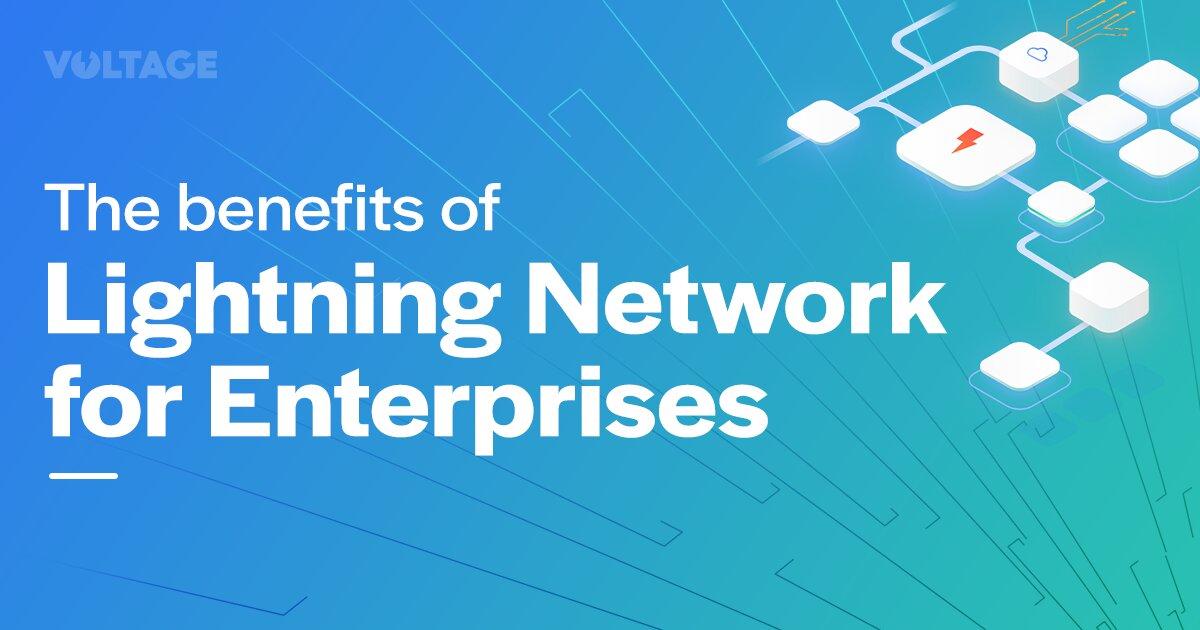
Exploring the Benefits of Lightning Network for Enterprises

The blockchain industry has grown. There are many ideas but few actually make a material impact on society, and those that do, change the world. One such technology is the Lightning Network. This is a payment protocol that addresses the scalability and high transaction fees associated with legacy banking and traditional blockchain networks like Bitcoin.
The Lightning Network has been growing in adoption and is seen as a game-changer, particularly for enterprise businesses. Today we will explore the benefits of the Lightning Network for enterprise businesses. We will understand how it works, examine real-world use cases, and dive into the process of integrating it into enterprise systems.
Understanding the Lightning Network
What is the Lightning Network?
The Lightning Network is a layer 2 payment protocol that runs on top of Bitcoin. It was developed in 2015 by Joseph Poon and Thaddeus Dryja as a solution to some of the scalability problems encountered in Bitcoin transactions. The Lightning Network allows for off-chain transactions between users, removing the need to interact with the main Bitcoin blockchain which requires a fee per transaction.
The Lightning Network is an innovative solution that enables fast, secure, and low-cost transactions on the blockchain. It provides a way to scale Bitcoin with higher transaction throughput and lower fees.
The Lightning Network is a layer built on top of Bitcoin's base layer and uses hash time lock contracts (HTLCs) to create payment channels between two parties. A flexible payment network can be enabled by opening and closing these channels. Learn more about HTLCs here.
How does the Lightning Network work?
Lightning Network creates payment channels between two parties by using smart contracts. Transactions can be conducted within the channel without being broadcast to the Bitcoin network. The network broadcasts only the starting and final settlement transactions, reducing congestion and transaction processing times.
When a payment channel is opened, one or parties deposit a certain amount of bitcoin into the channel. They can then exchange funds within the channel as many times as they want, without broadcasting each transaction to the Bitcoin network. The transactions are recorded on a smart contract, this creates a fairness protocol known as HTLC's.
Once the parties are done with their transactions, one or both parties can close the payment channel by broadcasting the final settlement transaction to the Bitcoin network. This final settlement transaction reflects the net balance of all transactions within the payment channel.
Key features of the Lightning Network
Lightning Network continues to advance as a legitimate use case for business enterprises. Lightning facilitates instant transactions. Lightning enables users to send and receive payments instantly which is ideal for micropayments and other time-sensitive transactions.
Second, it reduces transaction fees significantly because the opening and closing transactions are the only on-chain fees. This means users can save money on transaction fees, making it a cost-effective solution for businesses and individuals alike. Parties can participate in as many transactions as they like as long as the channel stays open. This feature creates opportunities for business at scale.
Third, Lightning payments are off-chain which improves privacy for users. This means that users can transact without revealing their identities or transaction details to the public.
Advantages of Lightning Network for Enterprises
The Lightning Network is becoming increasingly popular among enterprises due to a few eye-opening benefits. Let's break down four specific advantages.
Faster transaction processing
Lightning enables near-instant transaction processing times. Transaction confirmations can take several minutes or even hours on traditional blockchains. Enterprises that need to conduct high-volume transactions quickly can be severely impacted by this problem.
Lightning Network ensures the instant settlement of payments through its payment channels, which do not require network confirmations. As a result, cash flow can be improved and payment processes can be streamlined.
Lower transaction fees
With the Lightning Network, enterprises can carry out transactions at a significantly lower cost. There is a market incentive to offer fair competitive fees. This is a function of the decentralized peer-2-peer nature of the network.
If a node in the network increases its fees, that will be broadcasted to the rest of the network and payments have the ability to go around the increased fees and choose the best path to complete the payment.
Enhancing Privacy and Security
Security and privacy are of utmost importance to businesses. Due to Lightning Network's off-chain nature, transactions are not visible to everyone on the network, which enhances privacy and security.
By reducing fraud and hacking risks, it has become a secure payment protocol for enterprises. Other blockchains that promise fast speeds are often not decentralized and risk rollback or a pause of the blockchain as a whole.
Scalability and capacity
As a highly scalable network, Lightning can handle thousands of transactions per second without affecting performance. The capability to do an incredible volume of payments makes it compelling for business use cases.
Business enterprises can also start to leverage the Lightning Network to generate yield on idle cash by providing liquidity to the network. This helps improve scalability and network capacity.
Real-World Use Cases for Enterprises
Enterprises can benefit from Lightning Network in various ways, including cross-border payments, micropayments, supply chain transactions, and Decentralized Finance (DeFi) applications. We will break down a few of these use cases being done today.
Cross-border payments
Cross-border payments currently have high fees and take a long time to settle. Lightning Network solves this and enables instant settlements and lower fees. This enables businesses to become more efficient at cross-border transactions. Who doesn’t love saving time and money?
Companies that import goods from other countries can use the Lightning Network to pay their suppliers instantly and more cheaply. By eliminating intermediaries, payment delays and errors are reduced.
Micropayments and pay-per-use services
Enterprises can offer pay-per-use or micropayment services using the Lightning Network. Due to the lower fees and instant transactions, micropayments enable businesses to explore new business models that were previously impossible. This is known as Value 4 Value.
Lightning Labs has a functioning L402 protocol that enables businesses to charge satoshis for API requests. This will enable internet payments at scale in real-time for API calls. What is incredible is that 83% of the internet are API calls, so this is an absolute game changer for how money will flow globally.
Media companies can offer their content on a pay-per-view basis, so subscribers can pay a small fee to access specific articles or videos. Gaming companies are also using the Lightning Network to offer in-game purchases and rewards for engaged users. You can see this currently being done by Thndr Games.
Instant settlements for supply chain transactions
Supply chains are impacted drastically by not having the ability to do instant settlement of payments. Lightning helps businesses out with transactions reducing payment delays and eliminating the need for intermediaries. Synota is an example of who is doing this today.
As an example, a manufacturer may use the Lightning Network to pay its suppliers for raw materials instantly, ensuring that production will not be delayed. By streamlining supply chain operations, businesses can reduce costs.
Decentralized finance (DeFi) applications
Lightning Network can be used for decentralized finance applications such as decentralized exchanges and lending platforms. Instant settlement and lower fees make it an attractive payment protocol for DeFi applications.
Using the Lightning Network, a decentralized exchange can settle trades instantly at a lower cost, providing users with a seamless and affordable trading experience. A lending platform can also use the Lightning Network to instantly process loan repayments, improving efficiency and reducing default risks.
Integrating Lightning Network into Enterprise Systems
Choosing a Lightning Network implementation
Enterprises need to choose the right Lightning Network implementation for their needs. There are various implementations, and enterprises must consider factors like security, reliability, ease of integration, and scalability when choosing an implementation.
Setting up a Lightning node
You can spin up a lightning node in minutes by using the Voltage platform. We simplify payments of the internet by leveraging the lightning network. Spin up nodes, get liquidity, and explore the data of your node and its connectivity to the network.
Developing custom applications with Lightning Network APIs
The Lightning Network has a range of APIs that enterprises can use to develop custom applications. This allows businesses to create payment solutions that meet their unique needs, increasing efficiency and reducing costs.
Conclusion
There are tens of thousands of blockchains, but none deliver what Bitcoin can. For enterprises, the Lightning Network provides significant benefits through lower fees, instant settlements, and enhanced privacy and security. By exploring real-world use cases and integrating it into enterprise systems, businesses can leverage the Lightning Network's advantages to gain a competitive edge and unlock new business opportunities.